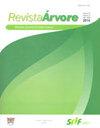安地罗巴油、COPAIBA油和麻疯树油提高油松木材对木材腐烂真菌抗性的效果
IF 0.8
4区 农林科学
Q4 FORESTRY
引用次数: 1
摘要
不可再生化学产品仍然是木材保护中使用最多的产品,然而,它们也有消极的方面。与这些物质的广泛使用有关的几个问题已被报道,例如动物和植物中毒以及环境污染。这促使人们寻找对环境影响较小的替代控制方法。在这种情况下,使用从不同植物中提取的天然产物可以替代这种工业活动。本研究的目的是评价加碘或富碘(I2)的安地罗巴、可伐巴和麻疯树油对引起褐腐、白腐和软腐的木材腐真菌的生物抵抗能力。安地罗巴和可伐巴油来自paro本文章由计算机程序翻译,如有差异,请以英文原文为准。
EFFICIENCY OF ANDIROBA, COPAIBA AND JATROPHA OILS TO IMPROVE THE RESISTANCE OF Pinus elliottii WOOD TO WOOD-DECAY FUNGI
ABSTRACT Non-renewable chemical products are still the most used for wood protection, however, they have negative aspects. Several problems associated with the extensive use of these substances have been reported, such as intoxication of animals and plants, and environmental contamination. This has led to a search for alternative methods of control that cause less impact on the environment. In this context, the use of natural products extracted from different plants can be an alternative to this industrial activity. The objective of this work was to evaluate the efficiency of andiroba, copaiba and jatropha oils, either pure or enriched with iodine (I2), to improve the biological resistance of Pinus elliottii wood to wood-decay fungi causing brown, white and soft rot. The andiroba and copaiba oils came from the state of Pará and the jatropha oil came from Paraíba. Thus, we performed resistance tests to accelerated decay (brown and white rot fungi) and soft rot tests in the laboratory. We used pure natural oils and those enriched with sublimated iodine in assessing efficiency. In turn, we evaluated the effects of volatilization and leaching on the efficiency of solutions against decaying fungi. Pure andiroba and jatropha oils were the least efficient in controlling the Trametes versicolor fungus in the accelerated decay biological assay. Moreover, the wood treated with pure copaiba oil (normal situation) was classified as non-resistant for controlling Postia placenta fungus. In the soft rot test, we observed that there was a tendency to improve the wood resistance (normal situation) with an increase in the iodine concentration (I2).
求助全文
通过发布文献求助,成功后即可免费获取论文全文。
去求助
来源期刊

Revista Arvore
FORESTRY-
CiteScore
1.00
自引率
0.00%
发文量
32
审稿时长
4-8 weeks
期刊介绍:
A Revista Árvore é um veículo de comunicação científica da Sociedade de Investigações Florestais – SIF. O jornal é de acesso gratuito, revisado por pares, que publica bimestralmente trabalhos científicos originais no campo da Ciência Florestal. As áreas temáticas para publicação são: Ambiência e Conservação da Natureza, Manejo Florestal, Silvicultura e Tecnologia da Madeira e Utilização de Produtos Florestais.
A política editorial visa manter alta conduta ética em relação à publicação e aos seus funcionários, rigor na qualidade dos artigos científicos, seleção de revisores qualificados, respeito profissional aos autores e processo de tomada de decisão imparcial. A Revista Árvore publica artigos apenas em inglês.
Artigos de revisão podem ser publicados se houver uma discussão relevante resumindo o estado da arte sobre o assunto. A revisão estrita da literatura não é aceita.
 求助内容:
求助内容: 应助结果提醒方式:
应助结果提醒方式:


